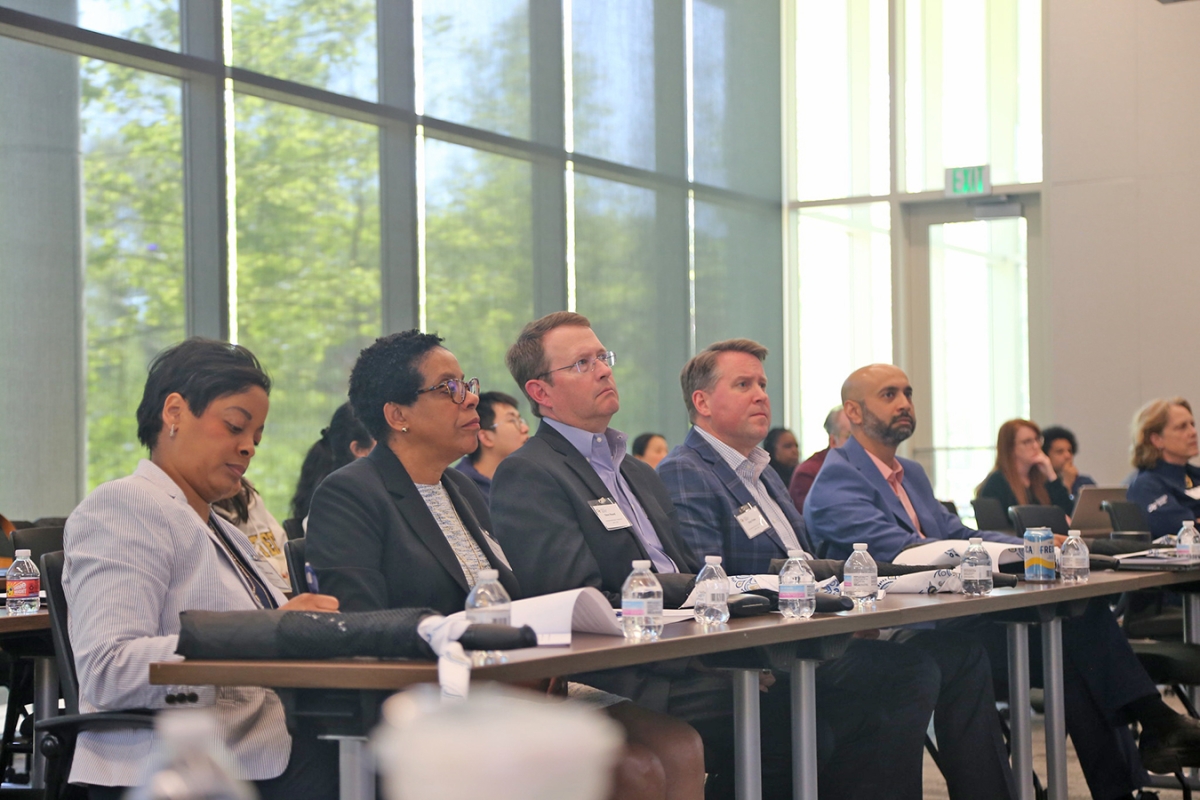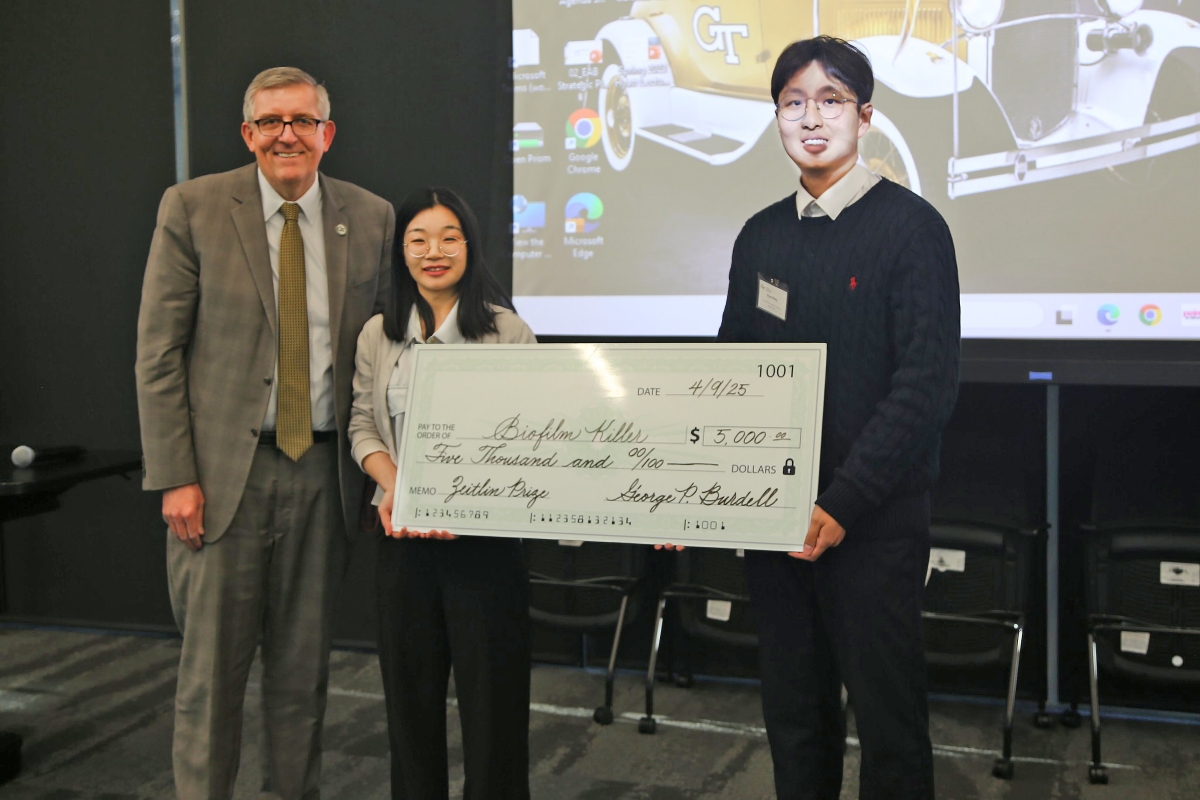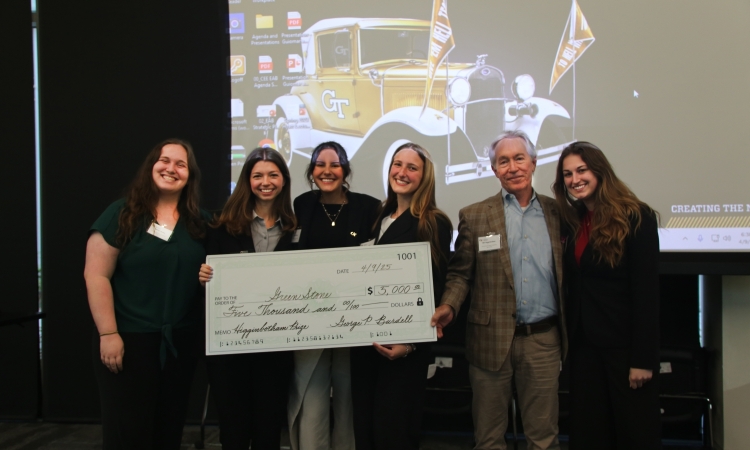Four teams of student innovators vied for two $5,000 prizes in the School of Civil and Environmental Engineering’s fifth annual Entrepreneurial Impact Competition on April 9.
Students were invited at the beginning of the spring semester to submit entrepreneurial ideas that would improve the human condition. The four finalists were selected by judges from a field of more than a dozen applicants.
Two teams prevailed with concepts for an anti-microbial surface to eliminate bacteria in humidifiers and a permeable paving system created from recycled construction materials.
Each of the four teams had five minutes to explain their concept in front of an audience and then field 10 minutes of in-depth questioning from the panel of judges. After the presentations, the judges deliberated and selected the winner of the two awards. The Higginbotham Entrepreneurship Award recognizes a more developed project, which is closer to being launched in the marketplace. The Zeitlin Innovation Award recognizes creativity in a project at any stage of its development.
GreenStone, the team comprised of Caroline Tucker, Camilla Roldan, Clara Hawkins, Madilyn Jacoby, and Kaylee Jordan, won the Higginbotham Entrepreneurial Award for their permeable paving system.
The GreenStone Permeable Paving System, consisting of GreenPAVE tiles and the GreenGRID reinforcement web, addresses two critical environmental challenges: stormwater management and construction waste.
2025 Entrepreneurial Impact Competition
Team GreenStone, left to right: Madilyn Jacoby, Caroline Tucker, Camilla Roldan, Clara Hawkins, and Kaylee Jordan pose with Bill Higginbotham, CE 76, after winning the Higginbotham Entrepreneurship Award.
The GreenPAVE tiles are made of 75% recycled construction waste and the GreenGRID web is made from 100% recycled HDPE material, which facilitates easy and uniform installation.
Team captain Caroline Tucker explained that the group shared “a passion for sustainable infrastructure and its place in our rapidly changing world.” GreenStone’s mission is “to develop innovative, sustainable stormwater solutions that transform construction waste into resilient infrastructure, reducing carbon emissions and enhancing the built environment,” she said.
Team member Clara Hawkins said that Greenstone would stand out in the market for two reasons: ease of installation, making the product more accessible to homeowners and contractors; and sustainability, leading the industry in the usage of eco-conscious materials. Hawkins noted that climate change is increasing the demand for permeable paving, with the market reaching $3.3 billion in 2024.
“Looking at our financial projections, we show strong growth, reaching profitability in just 26 months,” she said, predicting the company could reach $5 million in sales in year five.
Biofilm Killer, the team of FeiFei Liu and Shuai Wang, won the 2025 Zeitlin Innovation Award.
The team’s product is a novel electrophysical antimicrobial surface to deal with surface microbial contamination in humidifiers.
Biofilm Killer’s solution uses micro-interdigitated electrodes (MIDEs) to prevent bacterial attachment with intensive electric field strength. The team believes that integration of this effective antimicrobial surface into humidifiers can provide a bacteria-free solution and provide consumers with a better quality of life.
Team captain Liu asked the audience for a show of hands: First, how many people own a humidifier? Next, how many people clean their humidifiers once a week? Most people lowered their hands after the second question, illustrating the problem that Biofilm Killer aims to address.
She explained that the usage of humidifiers is on the rise in homes and healthcare systems around the world. However, humidifiers create an environment that promotes bacterial growth, allowing bacteria to spread through aerosols. Inhaling bacteria could lead to a condition known as “humidifier lung.”
Liu explained that their process, which is patent pending and has received a $25,000 Tech Ready Grant, is superior to disinfectants for three reasons:
- It provides greater surface and anti-microbial efficiency,
- It doesn’t utilize any harmful chemicals that can be inhaled, and
- It is energy efficient because a one-time treatment can insure surface hygiene in the humidifier for a long time.
She also said the team is looking to apply the technology to other high-touch surfaces like doorknobs.

Judges Danena Gaines, Kim Sanders, Steve Wassell, Chris Finke and Chris Martin (l to r) look on as a team gives a presentation. (Photo by Melissa Fralick)
Liu concluded by noting Biofilm Killer is not only important for the 20% of U.S. and Canadian households that use humidifiers. “It's also important for those 2.8 billion people who don't have safely managed sanitation, and also 1.9 billion people who don't have basic hand hygiene facilities.
“This can help us to achieve the United Nations Sustainable Development Goal 6, which is global sanitation,” she said.
The team of judges, comprised of CEE faculty and notable alumni who are business owners or experts in their field, were impressed by all the competitors.

Karen and John Huff School Chair Don Webster presents the Biofilm Killer team, FeiFei Liu and Shuai Wang with their $5,000 Zeitlin Innovation Award check. (Photo by Melissa Fralick)
“It was very difficult to choose a winner with excellent presentations being given by all the teams,” said Chris Martin, director of CEE’s Center for Collaborative Innovation and one of the judges for the event. “All of the finalists demonstrated a combination of intelligence and tenacity that merits recognition.”
The Entrepreneurial Impact Competition was established in 2021 to encourage a spirit of entrepreneurship in CEE students. The idea was led by Bill Higginbotham, CE 76, a serial entrepreneur and instructor who teaches Innovation and Entrepreneurship in CEE Systems. He endowed the Higginbotham Entrepreneurship Award and Greg Zeitlin established the Zetilin Innovation Award in honor of his parents, Phyllis C. And Alan G. Zeitlin, CE 62.

